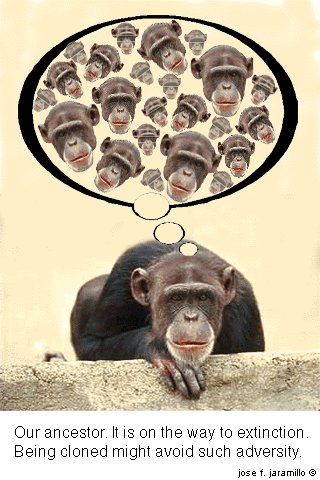By Jose F. Jaramillo Vasquez

Cloning might be one of the most providential instruments ever for saving endangered species. More desirable would be for instance to replenish the seas with multitudinous identical varieties of dolphins, than having just written and photographic records about how they were, looked and lived before man let them come to a full extinction, as already happened with so many animals.
Cloning could be the only available tool we would have in order to rescue so extremely difficult to breed animals as chimpanzees, panda bears, tigers, whales, condors and many other from the pitiful road to annihilation. Let us not take away from them what might be their last opportunity to survive on earth. Without needless delays, mostly caused by misconceptions, fears, ignorance, and absence of an open dialogue on the matter, we should encourage responsible research and development in order to aid nature to avoid such a disaster. Upcoming generations who would enjoy all those wonderful creatures and their countless descendants will thank us perpetually.
Given the striking achievement of having cloned different kinds of animals so far, it is mostly a matter of expanding funding and means of investigation, whenever possible oriented to discover the safest and most humane possible ways of cloning without inflicting tribulation or harming the dignity of those specimens being replicated. Furthermore cloning would allow to select the very best and healthier donors, contributing that way to a betterment of many animal species. That is what we have so successfully done with plants throughout millennia. Thanks to the vast experience and knowledge we have accumulated, now it is time to turn our thoughts towards the animal kingdom and -why not?- the human being itself. Otherwise evolution would impede and finally stop, and thus our still plausible dream of some day beginning to make real the enterprise of conquering the universe would vanish forever.
The author of this article, Jose F. Jaramillo Vasquez, believes that cloning could be a possible solution for the extinction of endangered species. We only publish this article because we believe that a dialogue about this matter should be kept.

